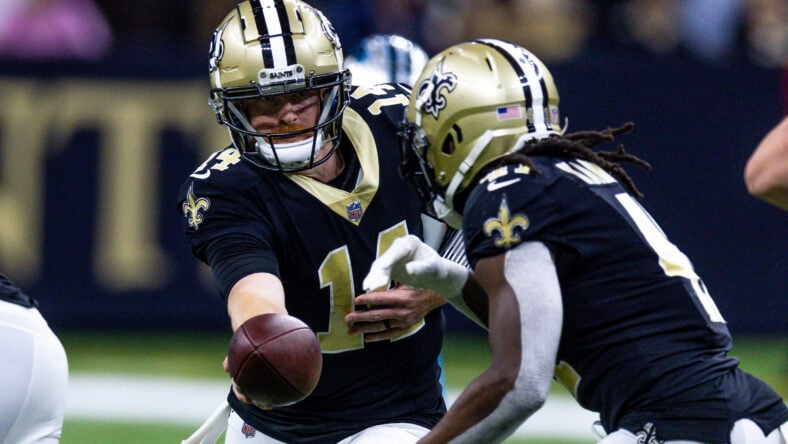“Every time you get a paper bag full of hundreds, it’s addictive.” How an ASU Point Guard, a Campus Bookie and A Chicago Bond Trader Gamed College Hoops.
Doping. Cheating. Gambling. Point shaving. Juicing. Even Killing. Those are just some of the ways that criminals, players, mobsters and even referees have tried to illegally put their thumbs on the scale of sports over the decades. Ever since the ancient Greeks ran the first marathon, people have been trying to make a buck by bucking the law.
The intersection of sports, and crime, is the focus of a new six-part documentary called “Bad Sport,” that just dropped on Netflix. Each episode tells a story that reminds the viewer that fact is sometimes stranger than fiction.
But today, we are focusing on episode 1: “Hoop Schemes.” It digs deeply into one of the most notorious and shocking gambling scandals in sports history. It left fans, players, reporters – basically just about everyone – saying ASU…OMG.
Let’s start at the beginning, in 1994, when the Arizona State Sun Devils were having a devil of a time trying to become an elite D1 hoops program. A sports columnist for The Arizona Republic perhaps summed it up best, “They were a sleeping giant, and most of us…thought this giant is never going to wake up.” But an elite recruiting class, led by Stevin “Hedake” Smith, hoped to change all of that. It’s pronounced headache, because that’s what he gave players who had to guard him.
But, instead of being remembered as one of the top scorers in ASU history, Smith has gone down in infamy as a central figure in an ugly criminal conspiracy. Smith himself explained, in “Hoop Schemes,” how he got in over his head, “Every time you get a paper bag full of hundreds, it’s addictive. It changed me.”
It also changed the way countless fans looked at the game they loved. Were point spreads and intentionally missed free throws now as big a part of the game, as pick and rolls, and jump shots?
All of a sudden, ASU basketball players who were once practically ignored, were treated like rock stars…until the program fell like a stone, including the biggest star of them all: Hedake. But man did he wind up giving college hoops a migraine. Smith had sweet spin moves, but he also had an axe to grind.
In the doc, he says, “we’re making the school all that money, and we didn’t get compensated at all.” So Smith found another way to cash in. Unfortunately, for him, that landed him in federal prison.
It all began when a twenty-something bond trader in Chicago named Joseph Gagliano got a call from the ASU “campus bookie,” Benny Silman, with an offer he couldn’t refuse. Gagliano started placing bets with Silman. Then one day, he says the bookie offered him “a fix.” A short time later, Gagliano says Silman mentioned “Hedake” Smith, and the bookie told the bond trader – “I got him.” Silman went on to say that Smith owed him at least ten grand, and couldn’t afford to repay him. That’s when Silman, according to Gagliano, told him he concocted a way for the player to repay the bookie – have him fix games so they could all make a killing.
Benny and Joe wound up offering Smith $20,000 per game to make sure that the Sun Devils didn’t cover the spread. Smith says as long as he didn’t have to lose intentionally, he was in. And the gamblers told the player he could get other players involved, if it would help the cause. That’s where Isaac “Ice” Burton fits in, aka “Smith’s Batman.” That’s when the caped crusaders sprung into action. Smith told Ice to “miss some shots to fix the game” – and Ice says he was chilly to the idea, until Smith showed him an envelope full of hundreds.
Then, Gagliano flew to Vegas to get things rolling. He wanted to bet $500,000 in cash on Oregon State, the underdog against ASU. He told Smith and Burton they could win, but the margin of victory had to be six points or less. ASU went up by 15 points in the first half, Smith was shooting lights out, and Gagliano was freaking out.
But the Beavers came back, as Smith admits he let the other team score, and slow-walked the Devil’s offense to let them catch up. In the end – Smith exploded for 39 points, but as planned, ASU did win by exactly six points. The payday for Gagliano – $1,100,000.
Next up was ASU versus Oregon. That netted Gagliano $2.5 million.
Smith then went on a spending spree, admitting he bought a car, and a whole bunch of other things that a student athlete couldn’t typically afford. That raised red flags, but the betting and the fixing continued.
A couple of games later – it was ASU vs. USC – and Gagliano had $2.5 million to bet. The Trojans hammered ASU, Smith laid an egg, but Gagliano still raked in $5 million, as he had the underdog, and the dog bit the Devils.
Now, Benny Silman reenters the game. Gagliano says Silman called him to say a big, scary local kingpin wanted in on the action. That was the beginning of the end. Gagliano had a bad feeling in the pit of his stomach, as he learned that the ASU, Washington game was getting a ton of attention, because the betting line was moving fast and furious.
Back in Phoenix, the FBI got wind of something screwy and started an investigation.
The season was over, but the trouble was just beginning…
Check out “Bad Sport” on Netflix to see how it all unfolds.
Fast forward and Smith did end up serving time but since then he has been working with the non-profit NOW (No Wasted Opportunity) to help be a mentor to underprivileged children. He also speaks at various colleges about the dangers of gambling.
For more of my true crime sports recommendations, follow me here at League of Justice and wait until you get a load of this one below.
Categorized:LOJ Exclusives More The Latest



